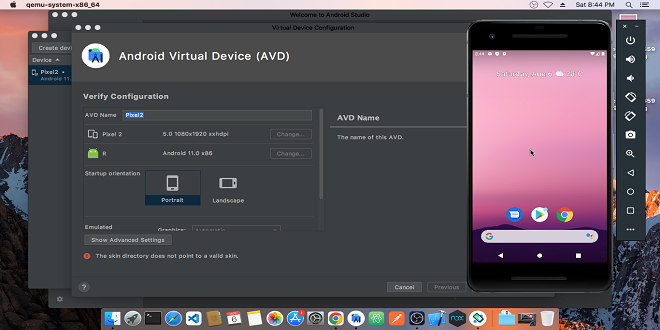Testing Android apps on an emulator is quite simpler and faster than doing it on a real-time device. For instance, we can transfer data speedier to the emulator than to an actual device linked through USB. The Android emulator is packed with predefined configurations for various Android tablets, phones, Android TV devices, Wear OS, etc.
Android Statistics (2022)
- Android is the famous and well-admired operating system around the globe, with over 2.5 billion active customers spanning over one hundred and ninety countries.
- Other stats showed that there are now 3 billion Android gadgets that have been active in the past few months. Google revealed that over 1 billion android devices were added alone in the past year.
Android Version- Current Market Share
Google has struggled to obtain OEMs to renew their smartphones at a rapid rate, which has meant the majority of updates hardly ever hit over 50 percent of Android users. Google’s 2019 data says, Pie 9.0, was the prime option or choice to hit over 35% of smartphones.
Android version- Current Market Share 2013 to 2022 (Percent)
The vendor like Samsung has held a prime position in market share since the early days of Android and has continued to function well. Chinese manufacturers superseded LG, HTC, and various others in the mid-2010s, and are currently responsible for over 50 percent of sales of Android gadgets.
iOS vs Android Market Share
Android leads and dominates in international market share, responsible for 70 percent of all mobile phone usage. However, in the UK, and US iOS has higher no. of users.
What is an Android Emulator?
Android emulator is an AVD (Android Virtual Device) and software designed to mimic the software and hardware of an Android mobile gadget for development as well as testing purposes. Android emulators will function on your PC or Mac so that you can build Android-centric apps at your desk. It provides almost all the features and functionality of an actual android device. We can get incoming text messages and phone calls. Android emulator also gives the location of the gadget and simulates varying network speeds. It properly simulates rotation as well as other hardware sensors. Android emulators can also access the Google Play store and many more. For instance, if you run your Instagram application in an emulator, it is possible to upload photos straight from your PC–something that is otherwise impossible. Its use generally relies on the user’s requirements and can be optional. It is beneficial to deploy the apps which are developed in the user’s IDE without really installing it in your system.
Pro-Tips before making use of any Android Emulator:
- If you are seeking an Android Emulator simply to experience the game and no other traits, look for open-source or free Android Emulators.
- Before utilizing any emulator verify if it has the current version of Android or not as it impacts the performance of the user.
- If the Android Emulator has a custom optimization preference, the user can easily change controls as per user need.
- It must support external devices such as IPad, mouse, or keyboard for a great gaming experience.
- It should have a great support team to resolve any glitches that the user faces such as bugs or installation.
- Scrutinize the reviews for the emulator if it has good desktop-to-mobile integration or not to avoid issues concerning compatibility.
6 Questions You Might Be Afraid to Ask About Android Emulators
- What is the key purpose of Android emulators?
The Android Emulator simulates Android gadgets on your PC so that you can test your app on a set of gadgets and Android Application Programming Interface levels without the requirements to have all physical devices.
- What are the restrictions of an Android emulator?
No support for receiving or placing real phone calls. One can easily simulate phone calls (received and placed) via the emulator console, but there is zero support for USB connections. No support for video capture or camera (input).
- What are characteristics/ traits of Android emulators?
An Android Emulator isn’t a real device. It mimics the hardware and software of the android gadget and lets you test it. Real-time Device Cloud lets you test performance bugs and hardware capacities. With Android Emulators, you can’t simulate hardware capabilities or performance issues.
- Why do we need Android Emulators when we straight have Android?
Android phones are portable, creative, and beneficial, but when it comes to standard use or long hours of usage at a time, they can’t match PCs. Here, the Emulator comes into the limelight as it lets us generate a bridge between the user’s Android gadget and the PC’s strong resources. It aids in minimizing the lags of Android games, lets users get access to PC controls, and chiefly lets the users utilize all their smartphone features on the PCs and a very big screen.
- The users get a similar feel of their Android gadget on their PCs.
- It will have a big display and therefore have better controls to use apps on PCs.
- Unlike Android smartphones, users do not need to worry about battery life problems. They can employ Android traits in their PC with indefinite battery life
- PC gives the capability to employ more apps at one time which is a beneficial feature.
- Computers are highly powerful than Android gadgets and can manage higher-definition videos and games at a polite speed. No performance problems linked with it on the PC.
- Unlike smartphones, Computers are more robust and rugged, so users use them for movies and games without the danger of getting damaged without problems.
- How Do Android Emulators Function?
Android Emulators function on the principle of total platform virtualization for both software and hardware. The Android Virtual Device (AVD) manager assists the user to set up and achieve the configurations for virtual Android gadgets. It has information on the system image, device type, or ABI (Application Binary Interface) and examines the configurations.
In a simple language, Android Emulator is well-known to mimic the gadget hardware. Now, post that, it assists to translate the ABI to match the host gadget. Then the user integrates it with the OS and executes it like an app or program on their PCs. In a few cases, the translation of CPU configurations is complex and can be slower, so it is better to have similar guest & host CPU configurations.
Android emulators, such as Genymotion, NoxPlayer, or BlueStacks, are software apps installed on your PC that can simulate the hardware and software experience of using an Android gadget. Using one allows gamers to play mobile Android games on Personal Computers and enables the software testers to develop and test Android apps in real time. Emulators mainly mimic the architecture of whatever system you are targeting. Therefore, you can search emulators for all sorts of hardware and software, depending on your necessities.
Want to eliminate the hassle of setting up an Android emulator for browser and app testing? Try LambdaTest – online Android Emulator to test your mobile web and native apps to ensure they are compatible with latest and legacy Android OS, browsers and devices. You can also run mobile automation testing of your Android web apps using Appium on the LambdaTest cloud.
What are the key advantages of Emulators?
The Android Emulator simulates Android gadgets on your PCs so that one can test your app on a set of devices & Android API levels without requirements to have every physical device. The emulator proffers these benefits:
- Speed: Testing your application on the emulator is in a few ways easier and faster than doing so on a physical gadget. For instance, you can transfer data more rapidly to the emulator than to a gadget linked over a USB.
- High fidelity: The emulator gives almost all the capacities of a real-time Android gadget. You can simulate incoming text messages and phone calls, specify the device location, simulate rotation, and simulate diverse network speeds, as well as other hardware sensors, use Google Play Store, and much more.
- Flexibility: Besides simulating a diversity of devices & Android API levels, the emulator comes with predefined configurations for a set of Android tablets, phones, Android TV devices, and Wear OS.
Other benefits:
- The gaming pleasure is doubled in contrast to mobile gadgets with huge screens.
- Multiple feature or functions support is now possible at an instance which is rather steady in mobile gadgets.
- There is zero terror of battery life ending as it doesn’t rely on it.
- Even if folks do not have an Android device it functions as a workaround for them.
- People can make use of it the whole day with undisturbed performance issues or any wear-out problems.
Gaming Benefits
- Huge screen, never misses any point
- 100% accuracy with the mouse as well as keyboard controls
- Mobile-centric Android Games on Computers
- Multiple games at the similar time
In the majority of cases, the emulator is the better choice for your testing requirements.
- How can we install Android Emulator?
The Android emulator can be installed when installing the Android Studio. But a few elements of the emulator might or might not be installed when installing Android Studio. For installing the emulator component, select the Android Emulator element in the SDK Manager SDK Tools tab.
You can also check the listed links and give a thorough explanation of how to install emulators.
- Installing Android Studio – Android Emulators
- Android Emulator for utilizing APKs
- How To Install And Download Memu play Android Emulator On PC/Laptop and Mac 100 %
Conclusion
The number of Android application users is booming. As per a recent Statista report, as of Jan 2022, Android is still leading the position of the mobile OS market. Thus, choosing the right Android emulator is of undeniable significance if you wish to experience the worst and best of your app on Linux OS & debug ASAP. Android emulators have completely revolutionized device capacities and user experience. Such emulators are no longer restricted to manual processes. Overall, they serve multiple purposes such as testing apps and gaming on huge screens.
 TECHGUIDANCES
TECHGUIDANCES




